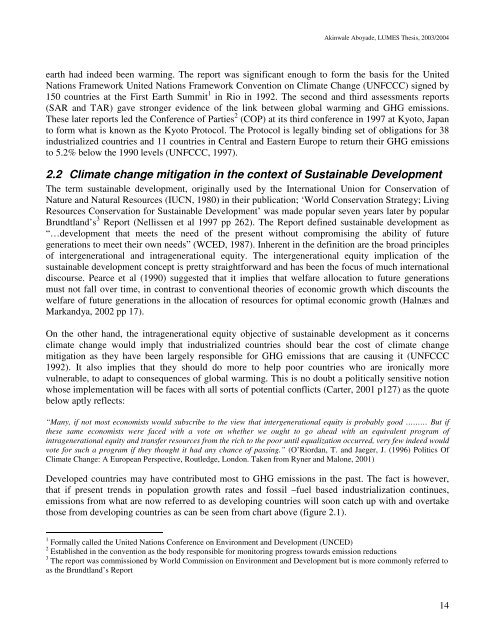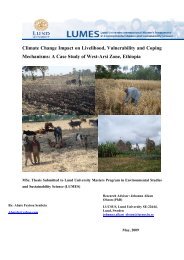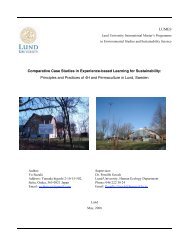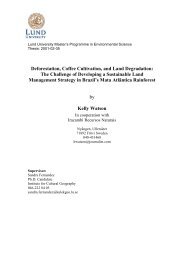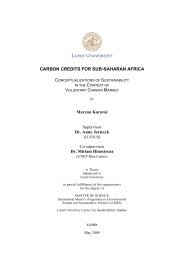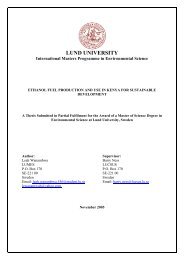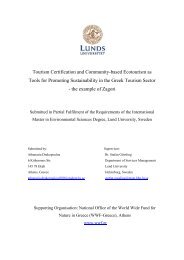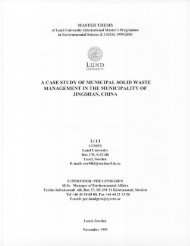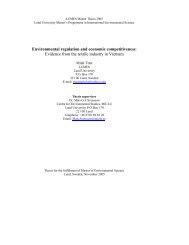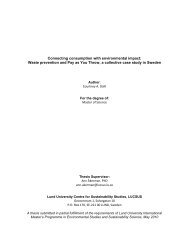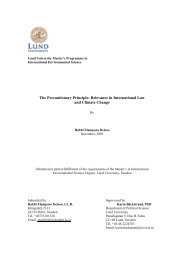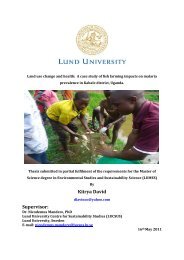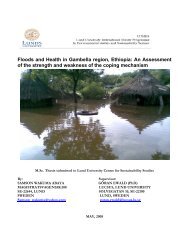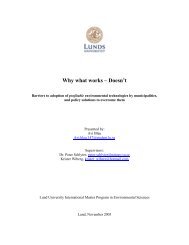Wale Aboyade's thesis - lumes
Wale Aboyade's thesis - lumes
Wale Aboyade's thesis - lumes
You also want an ePaper? Increase the reach of your titles
YUMPU automatically turns print PDFs into web optimized ePapers that Google loves.
Akinwale Aboyade, LUMES Thesis, 2003/2004<br />
earth had indeed been warming. The report was significant enough to form the basis for the United<br />
Nations Framework United Nations Framework Convention on Climate Change (UNFCCC) signed by<br />
150 countries at the First Earth Summit 1 in Rio in 1992. The second and third assessments reports<br />
(SAR and TAR) gave stronger evidence of the link between global warming and GHG emissions.<br />
These later reports led the Conference of Parties 2 (COP) at its third conference in 1997 at Kyoto, Japan<br />
to form what is known as the Kyoto Protocol. The Protocol is legally binding set of obligations for 38<br />
industrialized countries and 11 countries in Central and Eastern Europe to return their GHG emissions<br />
to 5.2% below the 1990 levels (UNFCCC, 1997).<br />
2.2 Climate change mitigation in the context of Sustainable Development<br />
The term sustainable development, originally used by the International Union for Conservation of<br />
Nature and Natural Resources (IUCN, 1980) in their publication; ‘World Conservation Strategy; Living<br />
Resources Conservation for Sustainable Development’ was made popular seven years later by popular<br />
Brundtland’s 3 Report (Nellissen et al 1997 pp 262). The Report defined sustainable development as<br />
“…development that meets the need of the present without compromising the ability of future<br />
generations to meet their own needs” (WCED, 1987). Inherent in the definition are the broad principles<br />
of intergenerational and intragenerational equity. The intergenerational equity implication of the<br />
sustainable development concept is pretty straightforward and has been the focus of much international<br />
discourse. Pearce et al (1990) suggested that it implies that welfare allocation to future generations<br />
must not fall over time, in contrast to conventional theories of economic growth which discounts the<br />
welfare of future generations in the allocation of resources for optimal economic growth (Halnæs and<br />
Markandya, 2002 pp 17).<br />
On the other hand, the intragenerational equity objective of sustainable development as it concerns<br />
climate change would imply that industrialized countries should bear the cost of climate change<br />
mitigation as they have been largely responsible for GHG emissions that are causing it (UNFCCC<br />
1992). It also implies that they should do more to help poor countries who are ironically more<br />
vulnerable, to adapt to consequences of global warming. This is no doubt a politically sensitive notion<br />
whose implementation will be faces with all sorts of potential conflicts (Carter, 2001 p127) as the quote<br />
below aptly reflects:<br />
“Many, if not most economists would subscribe to the view that intergenerational equity is probably good ……… But if<br />
these same economists were faced with a vote on whether we ought to go ahead with an equivalent program of<br />
intragenerational equity and transfer resources from the rich to the poor until equalization occurred, very few indeed would<br />
vote for such a program if they thought it had any chance of passing.” (O’Riordan, T. and Jaeger, J. (1996) Politics Of<br />
Climate Change: A European Perspective, Routledge, London. Taken from Ryner and Malone, 2001)<br />
Developed countries may have contributed most to GHG emissions in the past. The fact is however,<br />
that if present trends in population growth rates and fossil –fuel based industrialization continues,<br />
emissions from what are now referred to as developing countries will soon catch up with and overtake<br />
those from developing countries as can be seen from chart above (figure 2.1).<br />
1 Formally called the United Nations Conference on Environment and Development (UNCED)<br />
2 Established in the convention as the body responsible for monitoring progress towards emission reductions<br />
3 The report was commissioned by World Commission on Environment and Development but is more commonly referred to<br />
as the Brundtland’s Report<br />
14


